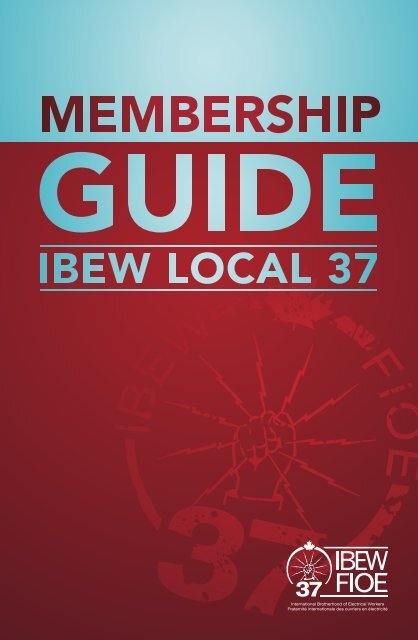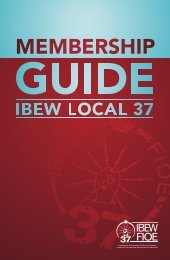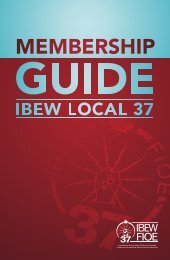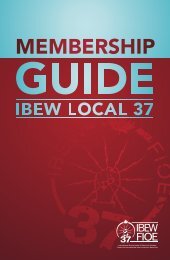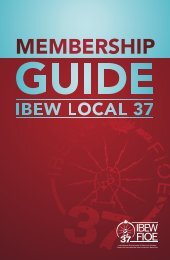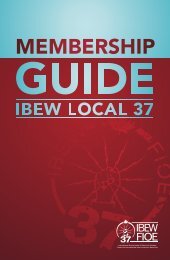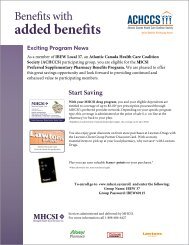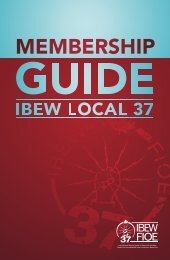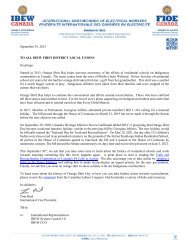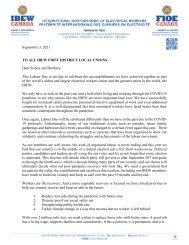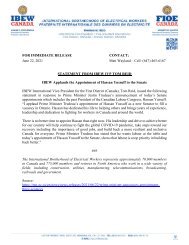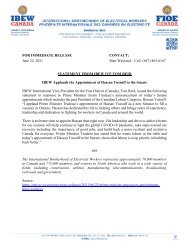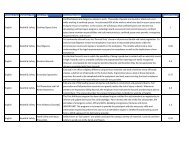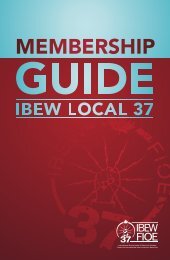IBEW Membership Guide - March 2024
You also want an ePaper? Increase the reach of your titles
YUMPU automatically turns print PDFs into web optimized ePapers that Google loves.
MEMBERSHIP<br />
GUIDE<br />
<strong>IBEW</strong> LOCAL 37<br />
International Brotherhood of Electrical Workers<br />
Fraternité internationale des ouvriers en électricité
OUR MISSION<br />
To work as a team to improve the lives of our members and their families.<br />
OUR VISION<br />
We shall be at the leading edge of the labour movement, serving our<br />
members with energy, enthusiasm and innovation.<br />
OUR GUIDING PRINCIPLES<br />
37<br />
We are first and foremost representatives of our members:<br />
We are committed to representing our members and positively impacting<br />
the quality of their lives.<br />
We are guided by the history and traditions of the <strong>IBEW</strong>, its<br />
constitution, and the Code of Excellence:<br />
We will honour and respect the principles of the <strong>IBEW</strong> and our actions<br />
will be guided by the terms under which we are a local of the <strong>IBEW</strong>.<br />
We balance individual needs with the collective interests of our<br />
members:<br />
We will earn the respect of our members by working for the collective<br />
good of all members.<br />
We are professional and proactive in our deeds and actions:<br />
We will demonstrate our respect for members and provide leadership by<br />
our professional, proactive approach to issues and interactions.<br />
We are financially responsible and accountable to our members:<br />
We will be open and transparent with respect to our goals and activities,<br />
and will be accountable to our members for how we conduct our business.
CONTENTS<br />
37<br />
Welcome . . . . . . . . . . . . . . . . . . . . . . . . . . . . . . . . . . . . . . . . . . . . . . . . . . . . . . 2<br />
Questions & Answers . . . . . . . . . . . . . . . . . . . . . . . . . . . . . . . . . . . . . . . . . . . 5<br />
The Union Advantage . . . . . . . . . . . . . . . . . . . . . . . . . . . . . . . . . . . . . . . . . . 18<br />
A Union of Professionals . . . . . . . . . . . . . . . . . . . . . . . . . . . . . . . . . . . . . . . 20<br />
<strong>IBEW</strong> History . . . . . . . . . . . . . . . . . . . . . . . . . . . . . . . . . . . . . . . . . . . . . . . . . . 22<br />
Health & Safety . . . . . . . . . . . . . . . . . . . . . . . . . . . . . . . . . . . . . . . . . . . . . . . . 24<br />
<strong>IBEW</strong> Structure . . . . . . . . . . . . . . . . . . . . . . . . . . . . . . . . . . . . . . . . . . . . . . . . 25<br />
Union Dues . . . . . . . . . . . . . . . . . . . . . . . . . . . . . . . . . . . . . . . . . . . . . . . . . . . 31<br />
The Collective Agreement . . . . . . . . . . . . . . . . . . . . . . . . . . . . . . . . . . . . . . 32<br />
Shop Stewards . . . . . . . . . . . . . . . . . . . . . . . . . . . . . . . . . . . . . . . . . . . . . . . . 34<br />
Grievances . . . . . . . . . . . . . . . . . . . . . . . . . . . . . . . . . . . . . . . . . . . . . . . . . . . . 36<br />
Training and Education . . . . . . . . . . . . . . . . . . . . . . . . . . . . . . . . . . . . . . . . . 37<br />
Health and Wellness . . . . . . . . . . . . . . . . . . . . . . . . . . . . . . . . . . . . . . . . . . . 39<br />
Getting Involved . . . . . . . . . . . . . . . . . . . . . . . . . . . . . . . . . . . . . . . . . . . . . . 40<br />
In the Know . . . . . . . . . . . . . . . . . . . . . . . . . . . . . . . . . . . . . . . . . . . . . . . . . . . 41<br />
More Benefits . . . . . . . . . . . . . . . . . . . . . . . . . . . . . . . . . . . . . . . . . . . . . . . . . 42<br />
Who's Who? . . . . . . . . . . . . . . . . . . . . . . . . . . . . . . . . . . . . . . . . . . . . . . . . . . 43<br />
Glossary . . . . . . . . . . . . . . . . . . . . . . . . . . . . . . . . . . . . . . . . . . . . . . . . . . . . . . 45<br />
Contact . . . . . . . . . . . . . . . . . . . . . . . . . . . . . . . . . . . . . . . . . . . . . . . . . . . . . . . 48<br />
– 1 –
TO ALL NEW MEMBERS OF THE <strong>IBEW</strong><br />
Greetings:<br />
Welcome to the International Brotherhood of Electrical Workers<br />
(<strong>IBEW</strong>), the world's largest electrical union. The <strong>IBEW</strong> celebrates over<br />
125 years of organizing and representing workers such as yourself<br />
in all branches of the electrical industry. You now belong to a proud<br />
labour organization with over 750,000 members.<br />
In addition to the Local Union Officers who stand prepared to<br />
represent you, the International Union has a highly trained<br />
professional staff of International Representatives who assist the<br />
Local Union in organizing, education, research, negotiation, and<br />
other matters relative to labour relations<br />
in your branch of the industry.<br />
Thank you for becoming a member.<br />
I, along with all of the officers and<br />
<strong>IBEW</strong> staff, wish you the very best<br />
of success and an enjoyable<br />
career as a member of the <strong>IBEW</strong>.<br />
In solidarity,<br />
Russ Shewchuk<br />
International Vice President<br />
– 4 –
YOU'VE GOT QUESTIONS?<br />
WE'VE GOT ANSWERS!<br />
Whether you're new to Local 37 or not, the last thing you need is<br />
a bunch of unanswered questions. So we're going to start out by<br />
answering the ones we get asked most often, but if we've missed<br />
any, just tell us. We'll get you the answer.<br />
WHAT IS A UNION ANYWAY?<br />
If you've never been a part of a union, you may not know what one<br />
is, or how one works. Basically a union is an organized group of<br />
workers who come together to pool their resources (time, money,<br />
brain power, experience, creativity, etc.) to help themselves and<br />
their colleagues win things like respect on the job, better wages,<br />
enviable benefits, and the best working conditions possible.<br />
– 5 –
WHY DO I NEED A UNION?<br />
A union helps level the playing field between you and your employer<br />
and, at the same time, gives you a voice in your workplace.<br />
With a union on your side, you'll never be alone. Suppose, for<br />
example, you have a specific problem with management. Would<br />
you rather deal with it alone, as you'd have to in a non-union workplace,<br />
or with the support of all of your fellow union members?<br />
Sure, one person can be strong, but imagine the strength of all<br />
your supportive colleagues behind you.<br />
You need a union because without one, there's risk that you'll be<br />
treated unfairly, without respect, be paid less than a decent wage,<br />
and be without benefits for you and your family. You could be<br />
disciplined or fired unjustly, denied promotions unfairly, harassed<br />
by bosses and coworkers, or be forced to work overtime without<br />
proper compensation. Those are some pretty sound reasons as to<br />
why it's good to have a union on your side.
HOW DID I BECOME A MEMBER OF THE <strong>IBEW</strong>?<br />
When you started working at your current job, you began a<br />
relationship with the <strong>IBEW</strong>. Provincial labour laws recognize <strong>IBEW</strong><br />
Local 37 as the exclusive bargaining agent* for all non-management<br />
employees within your company. So, as an employee within<br />
one of our bargaining units, you're now a union member, an<br />
important part of the <strong>IBEW</strong> family.<br />
ISN'T IT UNPROFESSIONAL TO JOIN A UNION?<br />
Academy Award winners Tom Hanks, Susan Sarandon and Matt<br />
Damon don't think so. Neither did world-renowned physicist<br />
* Words in bold font are defined in the glossary (page 45)<br />
– 7 –
Albert Einstein. These are just a handful of the artists, scientists,<br />
journalists, educators, and others who have been at the top of<br />
their professions and have strongly supported their unions. Union<br />
member professionals also include teachers, doctors, lawyers,<br />
college professors, nurses, TV broadcasters, and librarians.<br />
I HAVEN'T SIGNED A UNION CARD. SHOULD I?<br />
YES. And here's why.<br />
If you haven't signed a card, you're not yet a full member of the<br />
union. Instead, you're known as a “Fee Payer”. Although Fee Payers<br />
are automatically covered by the <strong>IBEW</strong> collective agreement for<br />
their particular group, they do not get to enjoy the privileges of a<br />
full membership. By signing a union card you're eligible to:<br />
•<br />
•<br />
•<br />
•<br />
•<br />
•<br />
•<br />
•<br />
•<br />
•<br />
•<br />
•<br />
Vote on contracts and other matters<br />
Vote for leaders<br />
Run for elected positions<br />
Serve in leadership positions<br />
Sit on committees and negotiating teams<br />
Address the Executive Board<br />
Make motions and vote at union meetings<br />
Attend union sponsored training<br />
Apply for union scholarships & bursaries<br />
Receive benevolent support<br />
Receive special union communications<br />
Attend <strong>IBEW</strong> conferences<br />
– 8 –
WHAT’S THE DIFFERENCE BETWEEN AN “A”<br />
MEMBER AND A “BA” MEMBER?<br />
In the <strong>IBEW</strong>, there are two types of membership – “A” and “BA”,<br />
and Local 37 represents both.<br />
“BA” members usually work for a single employer and have<br />
pensions and benefits negotiated as part of an <strong>IBEW</strong> collective<br />
agreement with the employer.<br />
“A” membership is open to everyone, but it’s typically maintained<br />
by members who work for contractors in the construction and/or<br />
maintenance side of the industry, as well as all <strong>IBEW</strong> international<br />
officers and representatives. They pay for, and participate in, the<br />
<strong>IBEW</strong> pension and death benefit funds.<br />
All “BA” members are encouraged to switch to an "A" membership<br />
and take advantage of the additional pension and death<br />
benefits. And switching is easy – just contact the Local 37 office<br />
to find out how!<br />
WHO REALLY RUNS THE UNION?<br />
Your union is a democratic organization run by members like you.<br />
Members elect other members to lead Local 37; vote on contracts,<br />
bylaws, and other important matters; and elect delegates to international<br />
conventions, who in turn elect international officers and<br />
vote on major issues affecting the union such as constitutional<br />
amendments. By working together, we can make the changes<br />
members want, share experiences and expertise, and deliver<br />
results that matter at work, home, and in our communities.<br />
– 9 –
DOES JOINING A UNION MEAN I'LL GO ON STRIKE?<br />
We certainly hope not. The main goal of having a union in the<br />
workplace is to negotiate fair working conditions and rules for<br />
everyone. Neither management, nor the union want to get in<br />
a fight. And it's worth noting that over 98% of collective agreements<br />
in Canada are negotiated without a work stoppage.<br />
The decision to go on strike is a very serious one and occurs only<br />
when workers feel they must take dramatic action to protect their<br />
rights, wages, and benefits. <strong>IBEW</strong> Local 37 has gone over 35 years<br />
without a strike. We attribute this to the healthy relationship and<br />
mutual respect we share with our employers. Members only go<br />
on strike if they vote overwhelmingly to do so. The decision about<br />
what to fight for, and how hard to fight, is always up to the union<br />
members.<br />
DO UNIONS MAKE A DIFFERENCE WHEN IT COMES<br />
TO JOB SECURITY?<br />
Unions protect workers from arbitrary employer actions relating to<br />
discipline and dismissals. For example, with a union you don't<br />
have to fear retaliation when you speak out about problems on<br />
the job. And through your collective agreement you can cut out<br />
favouritism, challenge unfair discipline, and make sure a fair<br />
approach is taken in the event of layoffs, promotions, transfers,<br />
and other decisions.<br />
– 10 –
WHAT MAKES ME DIFFERENT FROM NON-UNION<br />
EMPLOYEES?<br />
The biggest difference that separates unionized employees from<br />
non-union employees is having a collective agreement. Unions<br />
negotiate meaningful contracts that give unionized workers<br />
legally binding guarantees covering wages, benefits, rights and<br />
protections that aren't available to other workers.<br />
HOW ARE COLLECTIVE AGREEMENTS NEGOTIATED?<br />
Your collective agreement has a specified duration and must be<br />
renegotiated each time it expires. The negotiation process is<br />
called collective bargaining. (continued on next page)
But before negotiations even start, all members of the bargaining<br />
unit are invited to send in suggestions (proposals) for improvements<br />
to the terms and conditions of the collective agreement.<br />
The team, led by a full time union staff member and assisted by<br />
appointed representatives from the bargaining unit, meets with<br />
the employer's negotiating team to exchange proposals and work<br />
to reach a tentative agreement. This process involves a series of<br />
meetings and can be very quick or take years. During negotiations,<br />
all of the terms and conditions of an expired collective agreement<br />
remain in effect until a new agreement is reached.<br />
If negotiations reach an impasse, either team can request the<br />
assistance of an mediator from the labour board. The mediator's<br />
role is to promote objectivity and compromise, and can only make<br />
suggestions on how to make a settlement. If mediation doesn't<br />
work, both teams will consider other options.<br />
Eventually a tentative agreement will be reached and the<br />
members of the bargaining unit will participate in a ratification<br />
vote. If the majority votes to accept the agreement, it becomes<br />
the new collective agreement.<br />
WHAT DOES MY COLLECTIVE AGREEMENT COVER?<br />
Collective agreement specifics will vary from one workplace or<br />
employer, to the next, but generally they include provisions for:<br />
• Wages, hours and benefits •<br />
• Health and safety<br />
•<br />
• Non-discrimination<br />
•<br />
• Contract length<br />
•<br />
• Discipline<br />
Seniority<br />
Dues collection<br />
Grievance procedures<br />
Arbitration<br />
– 12 –
WHAT ARE MY RIGHTS?<br />
That's a big one to answer. For starters, you have the right to be<br />
treated fairly in the workplace. You have the right to be respected<br />
by your employer. And you have the right to be paid<br />
appropriately for the work you do.<br />
Those rights are laid out in your collective agreement. Notice<br />
the biggest word on the cover of your agreement is “Collective”.<br />
That's intentional because it's a deal worked out collectively<br />
between your union and your employer.<br />
WHAT DO I DO WHEN I THINK THE CONTRACT<br />
LANGUAGE IS BEING VIOLATED?<br />
Language is a funny thing. Even after employees and managers<br />
agree to put certain words in a contract, we don't always agree<br />
on what that language means when a real-life situation comes<br />
up later. Sometimes it takes a third party to sort it out.<br />
Your boss may ask you to do something that he/she believes is<br />
covered under the contract. You may not agree. What do you<br />
do? Check with your shop steward. If it's determined that the<br />
language of the contract is being violated, Local 37 will take the<br />
appropriate steps to make sure your rights are respected.<br />
– 13 –
WHAT CAN I DO IF A CO-WORKER IS HARASSING<br />
OR BULLYING ME?<br />
Both your union and your employer won't tolerate bullying or<br />
any type of harassment in the workplace. If you feel you've been<br />
harassed, bullied or discriminated against, your Local 37 shop<br />
steward will guide you through the process to help you file a written<br />
complaint to your employer's human resources department.<br />
Your contract allows you to speak up with confidence and know<br />
that you won't be punished for doing so. There's zero tolerance<br />
for discrimination or harassment. Your complaints will always be<br />
taken seriously. By speaking up, you might be saving other<br />
employees from similar grief.<br />
If you've been accused of harassment, Local 37 will also represent<br />
you. And if one union member complains of being harassed by<br />
another member, the union has obligations to protect the legitimate<br />
interests of both parties while the complaint is being investigated<br />
and beyond.<br />
Sometimes conflict can occur between members. If that happens,<br />
and representation is requested, Local 37 will assign a<br />
representative to each member.<br />
– 14 –
WHAT SHOULD I DO IF I'M ASKED TO<br />
DO DANGEROUS OR UNSAFE WORK?<br />
You have the right to refuse a work assignment<br />
if you have reasonable grounds to believe you'll<br />
be exposed to danger to your health, safety or<br />
physical well-being, or would expose someone else to the same<br />
danger. You must inform your supervisor as soon as possible of<br />
your concerns and your refusal to work. It's also a good idea to<br />
tell a shop steward or other union representative in case you<br />
need representation related to your refusal to work.<br />
IF I'M HAVING A PROBLEM, WHEN AND WHO<br />
SHOULD I CALL?<br />
The sooner you call, the sooner the matter can be dealt with.<br />
Local 37 will work with you to resolve the issue. Remember,<br />
we're always here for you!<br />
Your first call or visit should be with a shop steward. Shop<br />
stewards are trained and experienced in dealing with the day-today<br />
affairs of the union in your workplace, including resolving<br />
disputes with local management, grievances, and other issues.<br />
To see the current list of shop stewards available in your<br />
workplace visit the Local 37 website or call the union office.<br />
For whatever reason, sometimes members have issues or<br />
questions that can't be solved locally. If that's the case, please<br />
contact the Local 37 office so that you can be put in touch with<br />
one of our staff.<br />
– 15 –
CAN I FILE A GRIEVANCE AT ANY TIME?<br />
Unfortunately, no. A grievance must be filed within a specific<br />
timeline described in your collective agreement – for example,<br />
within five working days of the incident. Please talk to a shop<br />
steward as soon as you think you might need to file a grievance.<br />
IF I FACE EMPLOYER DISCIPLINE, WHAT DO I DO?<br />
If you're called to a disciplinary meeting with your employer,<br />
you have the right to have a shop steward or another Local 37<br />
representative with you at the meeting. You also have the right<br />
to have access to your personal file.<br />
– 16 –
IF I MENTION THE UNION OR THE COLLECTIVE<br />
AGREEMENT TO MY BOSS, WILL HE OR SHE GET<br />
ANGRY?<br />
The collective agreement outlines your rights as an employee.<br />
Reasonable people don't get angry when it comes to your basic<br />
rights. On the other hand, Local 37 is here for you to deal with<br />
people who do get angry and try to erode your rights.<br />
WHEN I MOVE, OR HAVE A NAME CHANGE,<br />
WHO DO I TELL AT THE UNION?<br />
Due to the Privacy Act, your employer will not provide these<br />
changes to the union office, so please let us know of any necessary<br />
changes that need to be made to your contact information.<br />
– 17 –
MORE ABOUT YOUR UNION<br />
The following section provides you with additional information we<br />
think will help you get to know your union even better.<br />
THE UNION ADVANTAGE<br />
One of the best things about your job is that you're now part of<br />
a union family of employees who belong to <strong>IBEW</strong> Local 37. By<br />
working together, union members can negotiate with employers<br />
from a position of strength and cooperation to improve working<br />
conditions and the standard of living. Because of unions, workers<br />
today (unionized or not) enjoy things like paid vacation time, civic<br />
holidays, maternity leave, the eight-hour workday, the weekend,<br />
health and safety laws, among many other very important<br />
professional and social advancements.<br />
– 18 –
Unions are the voice for the millions of working people and their<br />
families. They are committed to making a positive difference by<br />
doing things like lobbying government for health and safety laws<br />
to protect people from workplace injuries; campaigning for pay<br />
equity, retirement income, and fair treatment; and standing strong<br />
to protect the wages and benefits that they fought for decades to<br />
achieve.<br />
Together, as a union, we've been able to accomplish much more<br />
for ourselves and our families than we ever could have on our<br />
own. Together, we can improve both the quality of services we<br />
provide, and the communities in which we live.<br />
Without a union, employees are left to resolve issues and<br />
negotiate with their employer alone. With <strong>IBEW</strong> Local 37,<br />
members work together to support each other, improve working<br />
conditions through negotiations, and ensure everyone is treated<br />
with respect and dignity in a safe work environment.<br />
Sound pretty good? It is.<br />
– 19 –
Y<br />
T<br />
•<br />
I<br />
•<br />
A UNION OF PROFESSIONALS<br />
Unions come in all shapes and sizes. All have the best interests of<br />
their members at heart, but beyond that there are often significant<br />
differences in philosophy and approach.<br />
At <strong>IBEW</strong> Local 37, we like to feel, and have been repeatedly told,<br />
that we're one of the most forward-thinking unions in the country,<br />
and beyond. It's a reputation we're proud of.<br />
We're a union of professionals where all members are expected to<br />
strive for excellence when it comes to our quality of work, attitude<br />
on the job, building and maintaining relationships, working safely,<br />
and being active in our communities.<br />
IO<br />
S<br />
S<br />
E<br />
F<br />
RO<br />
P<br />
E<br />
F<br />
SA<br />
N<br />
A<br />
L<br />
I<br />
SM<br />
•<br />
ACCOUNTABILITY<br />
• R<br />
E<br />
L<br />
A<br />
T<br />
IO<br />
N<br />
S<br />
H<br />
PS<br />
Q<br />
U<br />
A<br />
L<br />
IT<br />
Y<br />
With the <strong>IBEW</strong> Code of Excellence<br />
Program, Local 37 has pledged to<br />
employers and the public that it will<br />
promote and encourage members<br />
to perform high value, quality work<br />
in a safe, professional, and efficient<br />
manner. And if a member isn't<br />
– 20 –
measuring up, we'll help them find ways to reach their highest<br />
potential.<br />
We always strive to be at the leading edge of the labour movement.<br />
Today, Local 37 is one of the largest and most progressive<br />
<strong>IBEW</strong> locals in all of Canada. A lot of our success comes from the<br />
way we approach a challenge.<br />
For instance, Local 37 believes that most workplaces have gotten<br />
past the old “us versus them” paradigm that was born back in the<br />
days when unions formed out of necessity to fight for basic rights<br />
against abusive bosses. Today, we're motivated by the understanding<br />
that we're in this together, and that the employer needs<br />
to be successful for us to benefit, so we look for solutions that are<br />
win-win.<br />
We work hard at building positive working relationships with our<br />
employers, but this isn't to say we don't have our disagreements.<br />
When we do, we have processes in place to work them out in an<br />
environment of professional respect.<br />
We fight hard for our members, but always at a professional, not<br />
personal level. Again, it's about win-win.<br />
– 21 –
<strong>IBEW</strong> HISTORY<br />
The Largest Electrical Union in the World<br />
The International Brotherhood of Electrical Workers has been around<br />
as long as the commercial use of electricity itself. It's the largest<br />
electrical union in the world, with a story that begins in the United<br />
States around 1890 when dangerous work, low wages, and long<br />
hours were the norm in the electrical industry. In many places, one<br />
out of every two electrical workers hired was killed on the job – the<br />
need to unionize was very strong.<br />
– 22 –
It was November 28th, 1891 when ten men, representing 286<br />
electrical workers, formed the National Brotherhood of Electrical<br />
Workers. They had one objective: to make life better for themselves,<br />
their families, and those around them. Eight years later,<br />
the national union became international when the first Canadian<br />
<strong>IBEW</strong> local was established in Ottawa on December 20th, 1899.<br />
Today the <strong>IBEW</strong> represents more than 750,000 members working<br />
in various sectors including utility, construction, maintenance,<br />
manufacturing, communications, railroads, shipyards, mining,<br />
government, and many more.<br />
Local 37 is young in comparison to its national and international<br />
unions, but its predecessors, Locals 1733 and 2309, have a long,<br />
proud history in New Brunswick. <strong>IBEW</strong> Local 1733 was issued a<br />
charter on September 1, 1951 and <strong>IBEW</strong> Local 2309 was issued its<br />
charter in 1971. In 1988, the two locals co-purchased our current<br />
headquarters at 138 Neill Street on the northside of Fredericton<br />
where they shared office space and staff. The two locals officially<br />
merged on April 3, 2000 to form Local Union 37.<br />
We're very proud of our history that was built on a firm commitment<br />
to organize and represent workers in order to make their<br />
lives better. Our membership and longevity are proof of that<br />
commitment.<br />
– 23 –
HEALTH AND SAFETY FIRST<br />
The <strong>IBEW</strong> was founded to ensure the safety of workers, and over<br />
125 years later, it remains a cornerstone of our union.<br />
We have a long history of fighting for health and safety rights for<br />
our members. We're proud to have a part in shaping provincial<br />
legislation that includes regulations for employers to maintain safe<br />
working conditions; protection against violence, harassment and<br />
discrimination; and rights and responsibilities with respect to<br />
safety equipment and training.<br />
Joint Health and Safety Committees are in place at many work<br />
locations and offer union members an opportunity to help reduce<br />
the incidence of workplace injury and disease. They can also make<br />
recommendations on how to stay safe at work, encourage<br />
compliance with regulations, and address any health and safety<br />
complaints or issues. This important work makes changes that<br />
benefit present and future members.<br />
If you ever have any health or safety concerns in your workplace,<br />
please tell someone immediately. And if you're not sure whom to<br />
tell, contact the Local 37 office and we'll be ready to help you.<br />
– 24 –
<strong>IBEW</strong> STRUCTURE<br />
The Constitution<br />
The <strong>IBEW</strong> Constitution is the supreme law of our international<br />
union. It describes the purpose for which our union was founded as<br />
well as its philosophy and structure. The Constitution also establishes<br />
the rights, duties, and privileges of the members, local union,<br />
and the International Office. If you haven't yet received a copy of<br />
the <strong>IBEW</strong> Constitution, please let us know and we'll send you one.<br />
International Convention<br />
37<br />
The <strong>IBEW</strong> is structured to be an efficient, productive organization<br />
that's driven by the membership. Along with the rules governing<br />
local unions, the structure of our union can be found in the <strong>IBEW</strong><br />
Constitution, Bylaws and Policies. Members of the <strong>IBEW</strong> are the<br />
only ones who can make amendments.<br />
INTERNATIONAL OFFICE<br />
The International Convention is the highest governing body of the<br />
<strong>IBEW</strong>. Held every five years, members elect delegates to represent<br />
their local union at the Convention. It's where all international<br />
officers are nominated and elected. This includes the International<br />
President, International Secretary Treasurer, 11 International Vice<br />
Presidents, and nine International Executive Council (IEC) Members.<br />
The Convention is also the time at which elected delegates<br />
determine the basic laws of the <strong>IBEW</strong> by their votes on proposed<br />
resolutions and constitutional amendments.<br />
– 25 –
Kenneth Cooper<br />
International President,<br />
<strong>IBEW</strong><br />
International President (IP)<br />
The International President is entrusted with the administration of<br />
the <strong>IBEW</strong> and is responsible for serving the best interests of the<br />
members and the labour movement. The IP may delegate the<br />
powers of the office to an International Vice President, assistant, or<br />
International Representative.<br />
International Secretary-Treasurer<br />
The International Secretary-Treasurer is responsible for handling the<br />
financial affairs of the <strong>IBEW</strong>. This includes being responsible for<br />
investing <strong>IBEW</strong> and pension funds.<br />
International Vice Presidents (IVPs)<br />
The 11 IVPs are elected by the local unions in their respective<br />
districts at the International Convention (Canada is the 1st District).<br />
They work under the instruction and authority of the International<br />
President and are responsible for the affairs within their district.<br />
Each IVP supervises a staff of International Representatives.<br />
– 26 –
International Executive Council (IEC)<br />
The IEC consists of nine elected members: one from each of the<br />
eight IEC districts and a chairman, elected at large. Meeting<br />
quarterly, the IEC deals with the <strong>IBEW</strong> pension fund, judicial<br />
matters, and other responsibilities.<br />
International Representatives<br />
The daily administration of the <strong>IBEW</strong> is the responsibility of the<br />
International Representatives. They provide guidance pertaining to<br />
administrative, financial, and legal matters; jurisdictional issues;<br />
collective bargaining; organizing; research and training; and other<br />
needs to local unions.<br />
LOCAL UNIONS<br />
Being part of a large international union, like the <strong>IBEW</strong>, means every<br />
local benefits from the considerable resources of such a major organization.<br />
And its structure provides an additional benefit that many<br />
other local unions don't have – independence. Each <strong>IBEW</strong> local has<br />
complete autonomy, which means most decisions are made locally<br />
by local members. For example, members of Local 37 elect their<br />
own officers, make their own bylaws and policies (approved by the<br />
International President), and determine their union dues.<br />
<strong>IBEW</strong> Local 37<br />
Local 37 has the autonomy and resources to do what's important<br />
for the membership. This allows us to define an approved structure<br />
that will support taking care of our business and responsibilities as<br />
effectively and efficiently as possible.<br />
– 27 –
<strong>IBEW</strong> LOCAL 37 STRUCTURE<br />
LOCAL 37 MEMBERSHIP<br />
ADMINISTRATIVE<br />
STAFF<br />
FULL-TIME STAFF<br />
BUSINESS MANAGER<br />
ASSISTANT<br />
BUSINESS<br />
MANAGERS<br />
INTERNATIONAL OFFICE<br />
*<br />
SHOP STEWARDS<br />
MEMBER OF THE BOARD –<br />
* HAS VOICE BUT NO VOTE<br />
EXECUTIVE BOARD<br />
• PRESIDENT<br />
• VICE-PRESIDENT<br />
• TREASURER<br />
• RECORDING SECRETARY<br />
• 6 UNIT CHAIRS<br />
• 5 MEMBERS AT LARGE<br />
Members<br />
Members are the highest decision making body of the union. They<br />
elect our leaders, run for leadership positions, and approve bylaws<br />
and policies.<br />
Executive Board<br />
The Local 37 membership elects the Executive Board (E-Board),<br />
which is made up of 15 elected officers. This includes four table<br />
officers (President, Vice President, Treasurer, Recording Secretary)<br />
and 11 member representatives (six Unit Chairs and five Membersat-Large).<br />
The E-Board meets regularly and works in partnership with<br />
the Busness Manager to lead our union in the direction that best<br />
serves the membership. E-Board members serve a four-year term.<br />
– 28 –
Business Manager<br />
The members also elect a Business Manager to a four-year term.<br />
The Business Manager is the principal officer of the union and is<br />
responsible for representing Local 37 when dealing with employers,<br />
enforcing all of the terms of the collective agreements, appointing<br />
and removing all shop stewards, being politically active, building<br />
and maintaining relationships with stakeholders, and overseeing the<br />
day-to-day operations of the union. All office staff, assistants, and<br />
shop stewards work under the direction of the Business Manager.<br />
Units<br />
<strong>IBEW</strong> Local 37 is divided into 6 geographic Units:<br />
1. Central (Fredericton region)<br />
2. Southern A (Saint John / St. Stephen)<br />
3. Southern B (Point Lepreau)<br />
4. Eastern (Moncton region)<br />
5. Western (Grand Falls / Woodstock)<br />
6. Northern (Bathurst, Miramichi, Tracadie)<br />
Every four years, each Unit elects a chairperson who also serves as<br />
an E-Board Member. Units hold regular meetings (monthly) that<br />
provide members an opportunity to discuss workplace concerns, get<br />
updates on negotiations, ask questions, and meet other members.<br />
For a complete schedule, check the Local 37 website, or contact the<br />
office.<br />
Committees<br />
Local 37 has a number of standing and adhoc committees that meet<br />
throughout the year to carry out their assigned tasks and make<br />
– 29 –
ecommendations to the E-Board. The types of committees are listed<br />
below. The President, in consultation with the Business Manager,<br />
appoints all members and ensures committees function efficiently<br />
and effectively.<br />
•<br />
•<br />
•<br />
•<br />
•<br />
•<br />
•<br />
•<br />
•<br />
•<br />
•<br />
•<br />
•<br />
High Level Labour Management<br />
High Level Safety<br />
Health, Wellness & Benefits<br />
Joint Benefits Advisory Committee<br />
Women's Committee<br />
Joint Health & Safety<br />
Canadian Council of Professionals<br />
Canadian Nuclear Workers Council<br />
Bylaws & Policies<br />
Finance / Audit<br />
Political Action<br />
Apprentice Advisory<br />
NextGen<br />
Local 37 <strong>Membership</strong> Team<br />
By being a member of the <strong>IBEW</strong>, you have the support of a team of<br />
professionals with expertise in many areas. We have the resources<br />
and trained staff to do the job of representing you in negotiations,<br />
safety, grievances, arbitrations, workers compensation, labour<br />
legislations, and all other areas of labour relations. With technical<br />
knowledge and innovative thinking, the Local 37 team is well<br />
positioned to respond to the challenges of changing times,<br />
technology, and workplaces.<br />
– 30 –
UNION DUES<br />
Every member pays a small portion of their wages to the <strong>IBEW</strong>.<br />
Union dues make it possible for Local 37 to pay for the valuable<br />
services it provides to all members including:<br />
•<br />
•<br />
•<br />
Contract negotiations<br />
Grievance support<br />
Arbitration<br />
•<br />
•<br />
•<br />
Training and education for members<br />
Education and awareness<br />
Organizing campaigns<br />
Think of union dues as an investment. Members contribute a small<br />
percentage of their earnings to a fund, much like you do with insurance<br />
premiums. When you need assistance, the resources you<br />
need will be there.<br />
Local 37's monthly dues are approved by members and are calculated<br />
using the following formula for both "A" and "BA" memberships:<br />
1.3 x your hourly pay rate + $22 (International Dues)<br />
For example, if you earn $20 per hour, your dues would<br />
be calculated as:<br />
1.3 x $20 = $26 + $22 = $48/month or $22.15 bi-weekly<br />
"A" members also pay an additional $21 monthly premium to the <strong>IBEW</strong> Pension Fund.<br />
Dues can be claimed as tax credit, reducing the amount of income tax<br />
you pay! All of the dues money paid by Canadian members stays in<br />
Canada, and the vast majority stays with the local union – ensuring<br />
members get the greatest benefit possible.<br />
– 31 –
THE COLLECTIVE AGREEMENT<br />
Having a collective agreement is the biggest difference between a<br />
unionized employee and non-unionized employee. Your collective<br />
agreement is a legally binding contract that sets the ground rules<br />
for your job on things such as working conditions, pension and<br />
benefits, your rights if you receive a lay-off notice, and what you<br />
can expect to be paid.<br />
<strong>IBEW</strong> Local 37 has worked hard to negotiate meaningful contracts<br />
that give members guarantees that cover wages and benefits, and<br />
rights and protections that aren't available to non-union workers.
Here are some of the major advantages of being<br />
unionized and having a contract:<br />
•<br />
•<br />
•<br />
•<br />
•<br />
•<br />
•<br />
•<br />
•<br />
•<br />
•<br />
•<br />
•<br />
•<br />
•<br />
•<br />
Respect and fairness on the job<br />
Better wage increases<br />
Retirement benefits<br />
Better schedules<br />
More job security<br />
More flexibility for work and family needs<br />
Safe and healthy work environment<br />
A real say in your job<br />
On more equal footing with your employer<br />
A better economic future<br />
Provisions for staffing and overtime<br />
Support for continuing education and training<br />
Fair and equal treatment<br />
Vacations and family leave<br />
Equitable promotion and transfer<br />
Workable grievance system<br />
– 33 –
SHOP STEWARDS<br />
Local 37 looks out for more than just negotiating your wages and<br />
benefits. Your union is always standing ready to lend support and<br />
help resolve any issues you might encounter in the workplace. The<br />
types of issues can vary from work location to work location, and<br />
nobody knows them better than your local union representatives –<br />
what we call shop stewards. Every bargaining unit has shop<br />
stewards in the workplace appointed by the Business Manager.<br />
They are trained to support fellow union members by helping<br />
them understand their contract and rights in the workplace.<br />
Whether it has to do with how you were hired, workplace safety,<br />
or a manager who consistently expects you not to claim overtime<br />
you're entitled to, shop stewards are responsible for making sure<br />
the collective agreement is respected and adhered to in your<br />
location. They'll do their best to resolve any problems that arise<br />
between workers and management at the local level.<br />
Members are encouraged to contact a shop steward first, and as<br />
soon as possible, if they:<br />
•<br />
•<br />
•<br />
•<br />
•<br />
Have questions about the contract<br />
Believe their employer violated their contract<br />
Have concerns about working conditions in the workplace<br />
Feel bullied, harassed, or discriminated against<br />
Suspect they might be disciplined or terminated<br />
– 34 –
Your steward, often in consultation with one of Local 37's full time<br />
union representatives, will help you determine if a grievance<br />
should be filed. A grievance is basically a formal complaint against<br />
an employer for violating the contract, work rules, or labour laws.<br />
In addition to representing members in the workplace, shop<br />
stewards have other duties that include, educating members about<br />
the union and the labour movement, encouraging members to<br />
attend meetings, helping organize new members, and acting as the<br />
liaison between union officers and the bargaining unit members.<br />
For the latest list of shop stewards, sorted by bargaining unit and<br />
work location, go to the Local 37 website or contact the office<br />
directly. If you're interested in becoming a shop steward, just let<br />
us know and we'll send you an application form.<br />
– 35 –
GRIEVANCES<br />
Without a union contract, employees can take complaints to management,<br />
but management has the final say on whether to make<br />
improvements or correct a problem. With a union contract, you<br />
now have grievance procedure in place to help resolve the issue.<br />
A grievance procedure is a method for solving employee complaints.<br />
It can also involve opposition to changes in the workplace,<br />
or a violation of the law. Your collective agreement outlines the<br />
complete grievance procedure and it's a shop steward's responsibility<br />
to provide guidance through the sometimes-complicated<br />
process. Before taking any action on your own, always contact a<br />
shop steward first.<br />
– 36 –
TRAINING AND EDUCATION<br />
There's more to life than work. And there's more to your union than<br />
helping you on the job. Local 37 is highly committed to offering<br />
members a diverse and valuable complement of training and<br />
education resources. After all, the best-trained and best-qualified<br />
employees are your employer's most valued assets.<br />
We're very proud of the Local 37 Training Trust Fund (TTF). The TTF<br />
gives members the chance to acquire skills that will help them both<br />
on the job and in their personal life. The focus is on leadership as<br />
well as the “soft skills” that involve personal development and<br />
interactions with other people. Training and learning opportunities<br />
are provided at no cost for eligible members through one-day<br />
workshops, an annual conference, and online courses.<br />
(continued on next page)<br />
– 37 –
The TTF also operates the Learning Reimbursement Program that<br />
provides financial assistance for individual members to support<br />
their training and development activities to a maximum of $2,000<br />
per person per fiscal year (depending on available funding).<br />
Activities must be pre-approved and may include courses offered<br />
by universities and other learning institutions, workshops and conferences,<br />
e-learning, and self-study. To learn more about the TTF's<br />
programs, please visit the Local 37 TTF website (www. ibew37.com/<br />
trainingtrust), or contact the union office directly.<br />
Don't forget to ask what kind of training opportunities your<br />
employer offers. If there's specific training that you're interested in,<br />
let it be known, as your employer must give your request proper<br />
consideration. If you're not accepted, you may eligible for<br />
assistance from the reimbursement program.<br />
Local 37 also provides training opportunities for local officers,<br />
stewards, committee members and other leaders through the<br />
International Office of the <strong>IBEW</strong> and its affiliates.<br />
– 38 –
HEALTH AND WELLNESS<br />
The <strong>IBEW</strong> Local 37 Health, Wellness, and Benefits Committee<br />
(HWBC) supports and encourages the health and wellness of<br />
its members. Its mandate is to help protect and maintain the<br />
interests of the members with respect to health, wellness, and<br />
benefits. The HWBC recognizes that health and wellness can<br />
mean many things to many people, so it works to develop and<br />
promote programs that cover a broad range of topics and<br />
interests intended to promote healthier lifestyles and workplace<br />
well-being. Any program the HWBC supports<br />
or manages must help promote healthy,<br />
active, and sustainable lifestyle choices.<br />
To learn more about the HWBC and<br />
the programs available, visit the<br />
Local 37 website.<br />
– 39 –
GETTING INVOLVED<br />
The <strong>IBEW</strong> is a strong united force that protects your rights in the<br />
workplace. To stay strong, Local 37 needs the support and involvement<br />
of members like you. Members bring new ideas that help the<br />
union better respond to the needs and wants of the entire membership.<br />
The more active the members, the more effective the union.<br />
You can think of your union as a health club. By only paying fees<br />
to a gym, you won't get into shape. You pay to get access to the<br />
equipment or tools needed to improve your health, but your health<br />
won't actually improve until you make use of that equipment. To<br />
see results, you must play an active part in the process.<br />
And you don't have to run for an elected position or be a shop<br />
steward to get involved. There are lots of other ways you can<br />
support your union, including:<br />
•<br />
•<br />
•<br />
•<br />
•<br />
•<br />
•<br />
Attend union meetings<br />
Read your contract<br />
Vote on your contract and other important issues<br />
Vote in union elections<br />
Volunteer for a committee<br />
Champion a union event<br />
Attend union conferences and training<br />
– 40 –
•<br />
•<br />
•<br />
•<br />
•<br />
•<br />
•<br />
Support your co-workers<br />
Support your union leaders<br />
Share your ideas for what to negotiate in your contract<br />
Participate in union activities, campaigns, and rallies<br />
Stay informed<br />
Read union publications<br />
Become familiar with your union bylaws and policies<br />
One of the best places to start getting involved is by attending your<br />
local monthly membership meeting (Unit Meeting). A complete<br />
schedule of meetings can be found on the Local 37 website. You<br />
can also contact the union office anytime to find out the details of<br />
your next meeting.<br />
KEEPING YOU IN THE KNOW<br />
Local 37 works really hard at trying to keep members informed<br />
about what's happening in the workplace, union, and community;<br />
and about issues and interests that are important to the membership.<br />
An informed membership is an empowered membership.<br />
All work locations should have a bulletin board for union-only information<br />
(let us know if you don't). Check them periodically and ask<br />
your shop stewards about activities when you have a chance to chat.<br />
Local 37 also regularly sends notices and updates via email and<br />
regular post. Please make sure we have your preferred contact<br />
information on file by contacting the union office. You can also visit<br />
our website, join our Facebook group, “Like” our Facebook page,<br />
and follow us on Twitter.<br />
– 41 –<br />
/ibew37 @ibew37 /ibew37
MORE BENEFITS OF<br />
MEMBERSHIP<br />
SCHOLARSHIPS AND BURSARIES<br />
As a member of the <strong>IBEW</strong>, you and your family can apply<br />
for the following scholarships and bursaries:<br />
• <strong>IBEW</strong> Local 37 Bursary –<br />
five awarded annually ($500 each)<br />
• <strong>IBEW</strong> 1st District Scholarship –<br />
ten awarded annually ($2,000)<br />
UNION PRIDE<br />
<strong>IBEW</strong> Local 37 sells union-made, branded clothing, mugs,<br />
pins, flags, bags, and a host of other items to help members<br />
show their union pride. If you're interested, stop by the office<br />
to have a look, or visit our website to see what's in stock.<br />
MEMBER DISCOUNTS<br />
The <strong>IBEW</strong> offers negotiated discounts to members on home<br />
and auto insurance, prescriptions, hearing care, life<br />
insurance, pet insurance, car rentals, merchandise at select<br />
retail outlets, and more. For more information, contact the<br />
union office or visit our website.<br />
– 42 –
UNION GLOSSARY<br />
Arbitration: When grievances don't get resolved they're sometimes<br />
sent to arbitration, where an independent arbitrator decides the outcome.<br />
An arbitration hearing is convened in which both sides present<br />
their arguments. The final decision of the arbitrator is binding.<br />
Article: A section of a legal document, such as a collective agreement<br />
or bylaw. It is also called a "provision", "clause", or "language".<br />
Bargaining / Collective Bargaining: Negotiations between the<br />
union and the employer where wages, benefits, and working<br />
conditions for a certain length of time are determined.<br />
Bargaining Agent: The union named as the exclusive representative<br />
for all the employees covered, or who will be covered, by the<br />
collective agreement.<br />
Bargaining Unit: All of the employees represented by the bargaining<br />
agent.<br />
Checkoff: A clause in a collective agreement that says the employer<br />
must deduct dues from workers' pay and send those dues to the<br />
union.<br />
Collective Agreement: The legal document (contract) that spells<br />
out the agreement between the union and the employer over<br />
wages, benefits, and working conditions.<br />
Discipline: When an employer punishes an employee for misconduct<br />
and usually includes verbal warning, written warning,<br />
suspension, demotion or firing.<br />
– 45 –
Duty of Fair Representation: Unions have the obligation to<br />
handle grievances in a manner that is not arbitrary, discriminatory,<br />
or in bad faith.<br />
Grievance: A complaint against an employer for violating the<br />
contract, work rules, or labour laws.<br />
<strong>IBEW</strong> Code of Excellence: A program designed to bring out the<br />
best in union members and demonstrate to employers and the<br />
public that <strong>IBEW</strong> members exercise safe and productive work<br />
practices, perform the highest quality and quantity of work, and<br />
utilize their skills and abilities to the maximum.<br />
Just Cause (or cause of discipline): The employer is responsible<br />
to establish a reasonable and lawful ground for disciplining an<br />
employee.<br />
Labour/Management Meetings: Meetings between representatives<br />
of the employer (management) and the union representing<br />
employees (labour). At these meetings, both parties discuss many<br />
different issues including interpretation of the collective agreement,<br />
training, changes in the workplace, etc.<br />
Last Chance Agreement: A written agreement between the union<br />
and the employer giving a worker, who has been accused of<br />
engaging in some kind of serious misconduct, one last chance to<br />
keep his/her job.<br />
Local Union: A union organization formed under the constitution<br />
of an International, national, or parent union. A local union can<br />
represent workers in one or more bargaining units. Local unions<br />
have their own bylaws and elect their own officers.<br />
– 46 –
Lockout: When the employer locks workers out of their workplace<br />
(denying employment) during a labour dispute.<br />
Mediation: If the result of a grievance meeting remains<br />
unsatisfactory, the union may decide to take the grievance to<br />
mediation.<br />
Mediator: A mediator is a third party who tries to bring the two<br />
sides together by working toward an agreement.<br />
Ratification Vote: A vote of bargaining unit members to accept<br />
or reject a proposed collective agreement (or other agreement).<br />
Shop Steward: Your trained union point-person at work who<br />
builds unity and helps fellow members solve problems.<br />
Solidarity: All members of the union-movement agree to help<br />
one another in their struggles for fair wages, safe workplaces,<br />
better benefits, and human rights.<br />
Strike: A collective action taken by all workers in a bargaining<br />
unit to put pressure on the employer to take their concerns<br />
seriously by withdrawing all, or some, of their labour.<br />
Tentative Agreement: A collective agreement agreed to by the<br />
employer and the union, but not yet agreed to (ratified) by<br />
bargaining unit members.<br />
<strong>IBEW</strong> Local 37 would like to thank the Canadian Media Guild (CMG) for<br />
permission to use content from the "CMG New Members Handbook".<br />
– 47 –
WE'RE HERE<br />
WHEN YOU NEED US<br />
37<br />
Members of Local 37 can receive the help they need when they want,<br />
where they want, and how they want:<br />
CALL<br />
Your call will be answered by one of our helpful staff Monday to Friday<br />
8:30am - 4:30pm. Voicemail is always available after hours. Call 455-0037,<br />
or if you’re outside of Fredericton, call us toll-free at 1-877-437-0037.<br />
COME ON BY<br />
You’re always welcome to drop by the union office through the week.<br />
We’re open 8:30am – 4:30pm and are located at 138 Neill Street on the<br />
Northside of Fredericton.<br />
CLICK<br />
Check out Local 37’s website (ibew37.com) for regular updates, information<br />
on training, contracts, policies, schedules, shop stewards, and much more!<br />
Email is a great way to get in touch too, send one anytime to info@ibew37.com<br />
138 rue Neill Street | Fredericton, NB E3A2Z6 | 506-455-0037<br />
1-877-437-0037 | info@ibew37.com | www.ibew37.com<br />
/ibew37 @ibew37 /ibew37<br />
– 48 –
•<br />
E<br />
E<br />
F<br />
H<br />
I<br />
•<br />
L<br />
Y<br />
IS<br />
L<br />
A<br />
N<br />
O<br />
M<br />
ACCOUNTABILITY<br />
•<br />
• R<br />
E<br />
L<br />
A<br />
T<br />
IO<br />
SI<br />
N<br />
S<br />
S<br />
RO<br />
PS<br />
P<br />
Q<br />
U<br />
Y<br />
T<br />
A<br />
F<br />
IT<br />
SA
International Brotherhood of Electrical Workers<br />
Fraternité internationale des ouvriers en électricité<br />
www.ibew37.com


